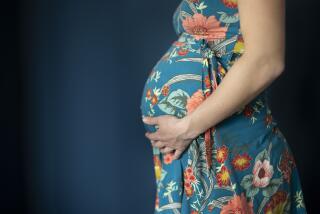Coffee, Alcohol No Boon to Baby
- Share via
Dear Dr. Blonz: I am 28 years old and in good health. I average about two cups of coffee each morning, and I usually have a couple of glasses of wine with my evening meal. What is the latest concerning the consumption of alcohol and caffeine during pregnancy?
--F.L.M., Oceanside
Dear F.L.M.: The debate over coffee and alcohol seems to have a life of its own. One study says coffee causes no problems, but another finds that it might. One study indicates that having more than three cups a day can significantly affect your ability to conceive, but another finds no such association. A recent study in New Zealand found an association between heavy coffee drinking (defined as more than four cups a day) during pregnancy and the risk of sudden infant death syndrome (SIDS).
The same kinds of positive / negative arguments can be found for alcohol. Rather than go through those particulars, let’s acknowledge that an excess of alcohol is definitely bad, and a moderate intake (about one drink per day with a meal) does not appear to be associated with any harm to the unborn child or mother.
One thing, however, rings true for both: Neither is essential to the health of your child. In my opinion, it would be best to taper off of both alcohol and caffeine--why not err on the side of safety?
*
Dear Dr. Blonz: Which vitamins and minerals play the biggest role in a baby’s development?
--A.P., South Orange, N.J.
Dear A.P.: One of the first parts of the body to develop is the nervous system. Folic acid plays a key role, but the catch is that folate must be present during the first few weeks after conception--a time when most women are unaware they’re pregnant. Spina bifida is a type of birth defect in which one or more of the vertebrae of the spinal column fail to develop properly, and 75% of all cases are attributable to a folate deficiency during the first few weeks of pregnancy. The U.S. Public Health Service recommends that all women of childbearing age consume at least 400 micrograms of folic acid per day.
There is also a special need for iron. The developing fetus needs to make its own blood supply, and it has to have sufficient iron stored up to supplement iron-poor breast milk. This helps to explain why the RDA doubles from 15 to 30 milligrams during pregnancy.
Calcium and vitamin D are extremely important as well, since they are needed for bone development. Calcium absorption doubles during pregnancy, and vitamin D is needed to help absorb and utilize that calcium. The RDA for calcium is 1,200 milligrams, and the RDA for vitamin D is 10 micrograms.
The final standout is water. A pregnant woman should drink eight to 10 glasses of water per day in addition to other liquids. Throughout pregnancy, a woman’s blood volume increases by 50%, and the extra water helps transport nutrients and oxygen to the developing child.
One final note: There are many resources on pregnancy available from your health professional, but I came upon a great instructional video for those contemplating a trip down family way. Titled “Before Your Pregnancy,” it’s by Amy Ogle, a registered dietitian with a master’s degree in exercise physiology. The video costs $29.95. For information, call (800) 955-5115, or visit the Web site https://www.b4yourpregnancy.com.
*
Ed Blonz is the author of the “Your Personal Nutritionist” book series (Signet, 1996). Send questions to: “On Nutrition,” Ed Blonz, c/o Newspaper Enterprise Assn., 200 Madison Ave., New York, NY 10016 or e-mail to ed@blonz.com. Personal replies cannot be provided.





